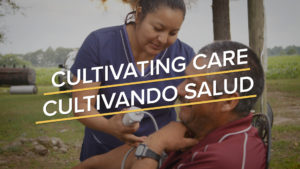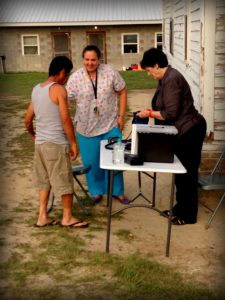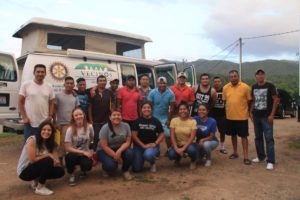The North Carolina Farmworker Health Program (NCFHP) is a statewide Migrant Health Voucher Program within the North Carolina Office of Rural Health.
Learn more about Migrant Health Voucher Programs (PDF), including where there are other voucher programs (PDF).
As opposed to a free-standing health center, NCFHP works with local agencies to provide care throughout the state with a focus on geographical areas with high densities of farmworkers. NCFHP responds to gaps in health care that would otherwise prevent farmworkers from accessing needed care.
Our particular model relies heavily on enabling services, including outreach, case management and health education, as we have learned that strong outreach and case management services are essential to connecting farmworkers with services.
NCFHP strives to achieve its mission through the following core activities:
- Funding local agencies to increase access to health care and dental services for farmworkers and their families
- Building sites’ capacity, through training and technical assistance, to provide quality, culturally and linguistically appropriate services for farmworker families
- Nurturing relationships and collaborations to leverage community resources
Why focus on farmworkers?
Farm work is consistently ranked among the most dangerous occupations in the United States, and farmworkers experience occupational health risks such as pesticide exposure, heat-related illness, green tobacco sickness, musculoskeletal injury and skin and eye conditions.
Farmworkers also suffer from chronic illnesses such as diabetes and hypertension, as do other low-income populations.
Geographic and social isolation, traumatic migration experiences, discrimination, separation from family members, and stress related to working and living conditions put farmworkers at risk for mental health problems.
Even though farmworkers are at such a high risk of injury and illness, they also face barriers to care, including limited availability of services in rural areas, cost, transportation, clinic hours and limited language capacity. Few farmworkers are eligible for public assistance programs and the majority lack health insurance.
How our contract sites serve farmworkers
Our outreach workers find farmworkers at migrant camps and in communities and assess farmworker health issues. Outreach workers refer farmworkers to primary and specialty providers, and support farmworkers in getting the care they need by offering enabling services such as interpretation, transportation and case management. At some sites, mobile medical teams provide medical services in the field.
Outreach teams also provide health education about preventive care, behavioral health, health care resources and broader community resources. They connect farmworkers to community resources and respond to farmworker concerns by adapting programming to meet expressed needs.
The North Carolina Farmworker Health Program is a vital component to the state of North Carolina’s safety net. Without the support that the North Carolina Farmworker Health Program provides, our state’s most vulnerable and underserved population would never gain access to health care services.”
–Nathan Dollar, former outreach coordinator, Vecinos Inc., and current board member
How our office supports our contract sites
NCFHP, often referred to as the central office, provides funding for outreach workers at contract sites to coordinate and carry out enabling services: health education, case management, interpretation, transportation. At some sites, we also fund medical services. The central office provides training for our partners, disseminating best practices for outreach, patient care, advocacy and community building.
We manage monitoring and evaluation of site processes and outcomes, which guides program strategy development as well as continuous quality improvement processes for medical and enabling indicators.
The central office also provides technical assistance on topics such as data management, health education resources, compliance with patient confidentiality protocols (HIPAA), regional partnerships and quality of care. Our team collaborates with local universities and community organizations to facilitate training, placement and support of volunteers and interns.
We serve migrant farmworkers who have traveled within the last two years to find agricultural work (both within the U.S. and from outside the U.S.).
We also serve seasonal farmworkers, who maintain a permanent residence and work in agriculture on a seasonal basis. We serve farmworker families, including spouses and children.
Leveraging resources
Our program strives for cost-efficient care by working with the strong rural health care network in North Carolina. Our sites are housed in county health departments, community health centers and non-profit agencies, allowing us to leverage existing resources such as facilities and support staff. In this way, we can target funding to our core activities: assessing migrant and seasonal farmworkers and connecting them to health care services.



